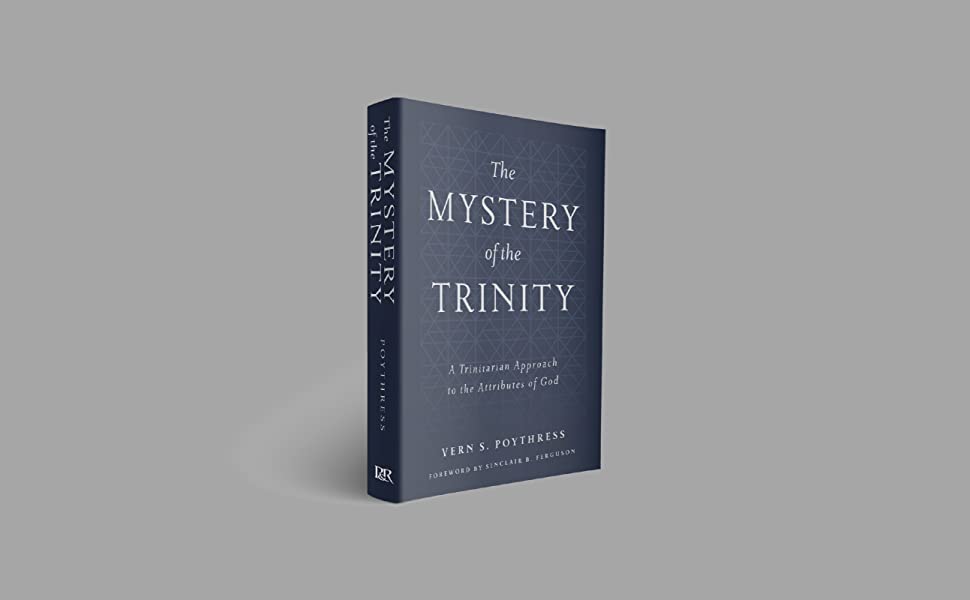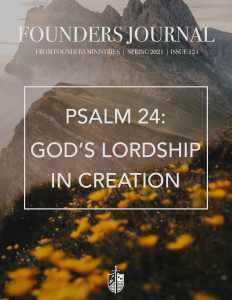Vern Poythress. The Mystery of the Trinity. Phillipsburg, NJ: P & R, 2020. 688 pages with appendices A-E, a glossary, bibliography, index of Scripture, index of subjects and names. Reviewed by Tom J. Nettles
I found this treatment of the Trinity by Poythress to be reverent, intensely biblical, relevant to tensions on this doctrine within evangelicalism, instructive exegetically and theologically, aware, engaged with historical theology, appreciative of what should be appreciated, cautious about the influence of philosophy on theology, kind to those who might differ with him on some points, and overwhelming in its scope and interaction. Also, it is clear that his straightforward critique of the intrusion of philosophy, particularly Aristotle’s, on the development of the vocabulary and concepts of Christian doctrine will cause criticism and some consternation.
Some features that should be attractive to all readers include his visual diagrams of various elements of his discussion (there are many of them and they are intriguing), his prayers at the end of each chapter, his consistent practice to relate the subject of each chapter, with few exceptions, to the resurrection, his contagiously exuberant insistence on the Bible as leading us to Christ “in whom are hidden all the treasures of wisdom and knowledge” (Colossians 2:3 – 67, 273, 372, 456, 534,595, 614).
The Mystery of the Trinity is clearly aimed at seeking clarity on some of the present tensions existent among reformed thinkers on the usefulness of natural theology as both prelude and support for the whole of systematic theology or whether systematic theology should be solely a synthesis of special revelation contained in Holy Scripture. This special revelation, of course would include inspired interpretations and explanations of the content and potential of general revelation, including the physical world and the operations of intellect and conscience. Tensions also exist in the relative emphases placed on transcendence and immanence and the sources for efforts to define those. Poythress gives specific attention to these tensions in pages 599-647. He reduces the camps to two (variations exist within each), classical Christian theists and Christian personalists (600).
Poythress plants his feet with some caution within the camp of Christian personalists, giving trenchant warnings against an undisciplined immanentism. He follows the views of Cornelius Van Til (533, 534), that we should be very suspicious of any attempt to import philosophy into theology. Particularly he has in mind Thomas Aquinas’s use of Aristotle supplemented at points by Plotinus and pseudo-Dionysius. Part 5 and the first chapter of part 6 give extensive attention to the ideas of Aristotle and the real and implied impact of his philosophy on classical theism (197-290). Poythress, though he seeks to acknowledge the points at which Aristotle’s philosophy crosses paths with true biblical orthodoxy, has very little patience with the degree to which “the Philosopher” has influenced the development of Christian theology. In a much less exalted judgment than that given to Aristotle by Thomas and the Thomists, Poythress employs a Pauline evaluation of pagan ingenuity in sidestepping the real implications of natural revelation in writing, “Aristotle is an illustration of the principle of Romans 1:18-23,” and continues, “which tells us that pagans know God and yet suppress this knowledge” (287). Poythress identified Aristotle’s flaw in his confidence in reason, “conceived of as operating independent of revelation. It is fallen reason that we are seeing in action” (287). Later, Poythress says, “Autonomous reason cannot stand the mystery of God’s revelation, and refuses to submit to it” (586). Near the end, Poythress urges his readers to “utterly abandon Aristotelian metaphysics, and the technical terms attached to it, because it is too treacherous for Christian theology” (593). He understands that the precision injected into discourse by Aristotelian categories is very tempting to theologians and philosophers and the removal of the “safety net” of such methods of argument seems to invite defeat. He has specific discussions of Turretin (esp. 344-367) and Charnock (esp. 396-422) concerning the dangers in which they placed themselves doctrinally by their use of such a method. Poythress continues to opt, however, for “the sword of the Spirit which is the word of God” (595) as sufficient to protect the Christian theologian in his efforts to know God and communicate knowledge of him.
One of the large ideas that undergirds much of the theological synthesis and critique of the use of philosophy (“spiritual poison” – 455) is the affirmation that the Trinity is “ontologically basic” (203, 204, 500 et al.). Deriving the phrase as a useful concept from a philosophical attempt at defining “substance,” (203, 204), Poythress gravitated to the idea of God’s nature as ontologically basic to all other things whatsoever. “And the way he is ontologically basic is not by being pantheistically identical with the world, but by being God. He created the world. And the way in which he is ontologically basic is by being the Trinitarian God, which does not come into the discussion when philosophers are talking about substance” (209).
Another way he says this is that the Trinity is the “archetype” for understanding the finite order of creation in all of its variety. For example, he wrote, “All distinctions are ordained by God. All distinctions have their archetype in the diversity of the persons of the Trinity” (268). He suggests provocatively “that the distinction between essence and accident [an Aristotelian concept] is a reflection of some archetype within the Trinity” (328). This can be done by staying outside of Aristotle’s system and taking a “Trinitarian starting point as ‘ontologically basic.’” Then we can maintain that God’s own words about his actions, given in Scripture, are expressions of his Trinitarian nature (327, 328).
The triune God is basic to the diversity of all things in the created order. Tri-personality in one God sets before us infinite diversity within eternal oneness. The Trinity must be fundamental to all discussions of attributes, transcendence, immanence, substance, or essence for ”the eternal activity among the persons of the Trinity has the potential for enhancing our insights without destroying anything in the truth of what classical Christian theism represents” (615). If we fail to give primary consideration to the biblical doctrine of the Trinity as the primary focus of discussions about divine attributes, we slide into errors that can be overcome only by introducing Christian orthodoxy through a “back stairway” (336, 337, 476, 500, 501). The philosopher “knows about a secret, hidden back stairway,” an apparently esoteric knowledge disconnected from the assumptions that have governed our philosophical god-talk.
An abstract concept of simplicity and/or immutability would call into question a dynamic and ongoing interaction of persons within deity and enervate the intimacy of his involvement with the world and his own chosen people. If we omit these—primary phenomena when we begin with the biblical picture of trinitariansim—as necessary considerations when discussing transcendence and incomprehensibility, we can present God as “a remote, uninvolved, frozen God” (615) whose “simplicity” seems to exclude the dynamic interaction of persons in the Trinity as well as God’s upholding of the world, preserving his people, and working “all things after the counsel of his own will.” This is what Poythress call the “black hole” (441) or the “frozen pond” (457) of transcendence. “We need to be aware of the black hole on our right. We begin to slip into its pool if we think we must avoid robust language about God’s activities that involve response. The suction of this pool tells us the lie that we are compromising God’s absoluteness” (513).
In that same framework, a discussion of God’s immanence apart from constant attention to comprehensive biblical trinitarianism has deadly dangers. He calls this “the peril of false immanence” (635). Without assuming the dynamic perfection and eternality in intra-trinitarian relationships and the implications of resurrection for both knowledge of God and infinite exaltation, immanence can lead to the “quicksand” that sucks God into the world so as virtually to be overcome and at the mercy of fortuitous circumstances. While we should not be afraid of the language that affirms that, to this created order, God responds, “we still need to constantly remind ourselves of the quicksand threatening to suck us in on the left … We can never simply project the finiteness of human action back onto the infinite God” (512, 513). So it is for “open theists” (600).
The eternally generated Son of God also is the Word of God and is the “archetype for God’s speech that creates things in the world” (252). In the logic of creation, God is the archetype, and the world’ phenomena, particularly human actions, are “ectypal reflections” (513). This eternal reality is fundamental to the temporal development of and differentiations between various languages (213) including all issues of vocabulary and syntax within discreet languages. Speech itself, derived from the operations of the divine Logos within the Trinity (204) exists in the world as a reflection of an ever-communicating trinitarian God as revealed in Scripture. “In the beginning was the Word.” His speech as a projection of his own internal relational logic and teleology establishes all the diversity present in the world as well as the unity present in the universal teleological connections of all things.
All our observations are partial and sometimes positively erroneous. For certain, they can never, ever match the knowledge that God has about everything or properly conceive of the final purpose for which God created the world. At the same time, Poythress claims, “we have an analogy, not an identity,” between the created and the Creator. “God in his Trinitarian character is distinct from the world, but through the Word and the Spirit he is also the origin for the distinctions and structure in the world” (252). The resurrection, an idea unknown to Aristotle, is the key to that; so “Christ in his resurrection is ‘ontologically basic’ for the whole new world order, the new heaven and the new earth, including its human inhabitants” (240).
The fact that the Trinity is ontologically basic to discussions of the world and the nature of truth means that Scripture is epistemologically basic (585) as the fountainhead of all knowledge. As God by his word made the world, so by his word, he puts into human language truths that fit both our finiteness and our need for knowing and believing the truth. Though Poythress scatters arguments throughout about the nature and authority of Scripture, appendix E (629-647, “The Meaning of Accommodation”) gives a detailed discussion of anthropomorphism and accommodation, setting the discussion in the form of perils of wrong understanding. A summary of the discussion is captured well on page 646: “Every text of Scripture suits the time and place and circumstances and human intermediaries who are present as contexts in which it newly comes. God’s speech is always coherent with the contexts that he himself specifies by his speech governing the universe (Heb. 1:3). That is the real meaning of accommodation” (646).
He ends the book with this prayer: “Lord of the universe, may we be wise in recognizing our limitations in receiving and understanding Scripture, and at the same time give full value to the depth of what you communicate to us. Thank you for communicating to us deeply as well as taking into account our limitations. Thank you for opening fellowship with you in your love” (647).





















